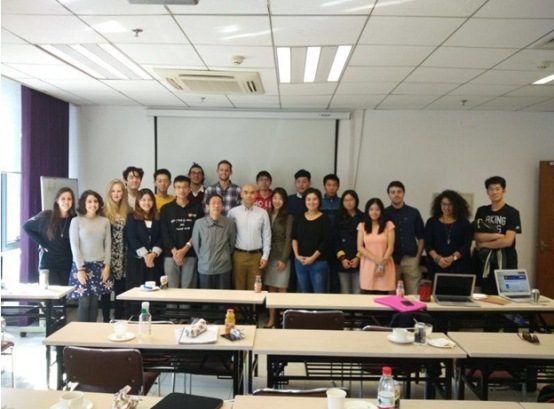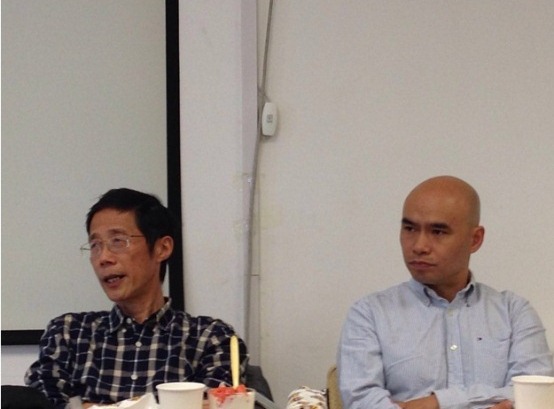On October 9, 2015, Mr. Shu Zhan, the former Chinese Ambassador to Rwanda and Eritrea, met with graduate students from Tsinghua’s Department of International Relations for an intimate conversation on his extensive research and diplomatic career. This event is part of an extinguished guest speaker series within the Tsinghua-SAIS dual degree program’s curriculum in “Case Studies of Diplomatic Practices.” The discussion proved to be a uniquely special opportunity for students to learn from a primary source the mechanics of African economic development outside of international media reports and academic literature.

The honorable Shu Zhan with students from Tsinghua’s Department of International Relations.
Because Mr. Shu first worked in Africa as an academic researcher and political consultant before joining the Ministry of Foreign Affairs, he offers a uniquely comprehensive perspective on Chinese investment in Africa and other development issues faced by the continent generally. In part because of his own background in agriculture as a youth in China, he enjoyed working side by side with locals and Chinese specialists on the field in Eritrea and Rwanda. He reflected fondly on his onsite access to observe firsthand the progress of aid projects and their effectiveness in serving the local community. Mr. Shu found this experience to be valuable when he later served in the Ministry of Foreign Affairs at the policymaking and diplomacy levels, consulting both senior Chinese and African government officials.
Mr. Shu shared his reflections on specific cases of Chinese aid in African agriculture, and compared the challenges and lessons learned between the successful and less effective projects.
In Rwanda, he worked on a long-term initiative that managed 12 to 13 agricultural projects. He shared his observations of these projects using non-indigenous plants to address issues requested by the Rwandan Ministry of Agriculture for solutions to expand the country’s agricultural industry with new products and combat the erosion of hills caused by heavy rain. Mr. Shu’s stories from Rwanda also showcased successful examples of importing Chinese agricultural traditions and lessons learned from investment projects in other developing areas of the world. In one instance, Rwandans had introduced eucalyptus trees because of their fast growth. Unfortunately, introducing this foreign species into the local soil proved to be counterproductive to addressing the initial issues and damaging to the local ecology. Eventually, Chinese specialists imported elephant grass from South America that had proven successful in effectively addressing erosion problems in Fujian. This plant also yielded positive results in Rwanda. In a controlled experiment comparing two fields, it was found that the plant controlled erosion by 75 percent. The plant grew 1.2 meters high in 6 months. Farmers fed the elephant grass to cattle, further maximizing the use of elephant grass in supporting another important source of income. Additionally, the plant could be ground and burnt to produce electricity.
Another project aimed to empower a small group of 10 to 12 female college graduates who otherwise could not find employment. They farmed a mushroom species native to China with the intention of supplying an existing East Asian market. Mr. Shu was proud to report that he personally saw that this product had successfully entered the local Rwandan economy. Today, this particular mushroom can be found in popular dishes in local hotels and restaurants.

Professor Xiaoyang Tang moderates discussion on Chinese investment in Africa with guest speaker, the honorable Shu Zhan.
As he discussed challenges faced by agricultural projects in Asmara versus Kigali, Mr. Shu noted that knowledge transfer was a difficult and unsuccessful endeavor for several reasons. In Eritrea, the field sites were spread apart, making it difficult to incubate innovative ideas and share best practices. Turnover was frequent; the majority of Chinese specialists and laborers stayed onsite on average only two years. Compared to case studies in Eritrea, several of the projects he observed in Rwanda were successful in part because the Chinese specialists and laborers worked onsite long-term at an average 4-5 years, long enough to learn the local language. While there are clearly successful case studies of the transfer of Chinese products and know-how, there are important lessons to be learned from observing well-intentioned experiments that fail. China implemented the use of bamboo which has served as a reliable construction material in Rwanda the same way it has served construction in China for thousands of years. However, Mr. Shu’s observation of the Chinese experience to encourage rice farming in Rwanda led to his conclusion of the importance of consistently calibrating investment policies to the local work culture and the unique demands of the local market. Rice planting is profoundly tedious work, and Chinese specialists had trained local Rwandans on techniques to reduce the work by 50 percent. Upon returning to Rwanda from a one-month holiday, the Chinese specialists found that Rwandans had replaced entire rice fields with potato fields. Potatoes fields only take six to seven months to harvest. 90 percent of the local rural community consumes potatoes and corn, and there didn’t exist a local desire to farm rice for urban areas when farmers could sell surplus potatoes and corn at the local market for cash.
The main lesson offered by Mr. Shu for sustainable and effective investment policies in Africa is to include the voices of local communities and further, to include their participation during the planning stages. He ties this important lesson from his field experience to diplomacy issues encountered at the senior government level. While many African nations welcome a multilateral cooperative effort for investments that can include China, U.S., EU and international financial institutions, However, he found that African nations often rightfully question the absence of multilateral meetings and the frequency of exclusive bilateral meetings for policy discussions that do not invite African nations to the table. Mr. Shu personally attested to witnessing how such exclusive practices have proven to be counterproductive in fostering trust and confidence from African leaders. In recent years, President Xi Jinping and Foreign Minister Wang Yi have espoused a new principle to investing on the African continent, “非洲提出,非洲同意,非洲主导,” or “proposed by Africa, consented by Africa and led by Africa.”
The students were very interested to hear directly from Mr. Shu that the trajectory of China’s engagement in Africa will continue to expand and not remain exclusive to only trade and other economic interests. Speaking further on how China’s Africa foreign policy has endeavored to be inclusive with respective host countries, Mr. Shu clarified that the Forum for China-Africa Cooperation (FOCAC) was established not by China, but from the request of numerous delegations from different countries that had traveled to Beijing over the course of several years to pitch for China’s engagement with select African nations on the multilateral level, beyond the traditional bilateral level. From Mr. Shu’s interesting anecdotes of his consultation work, the students also learned that African government leaders are also looking increasingly towards China for advice beyond that of building a strong economy but for examples of effective governance principles conducive to political stability and normalized leadership transitions.